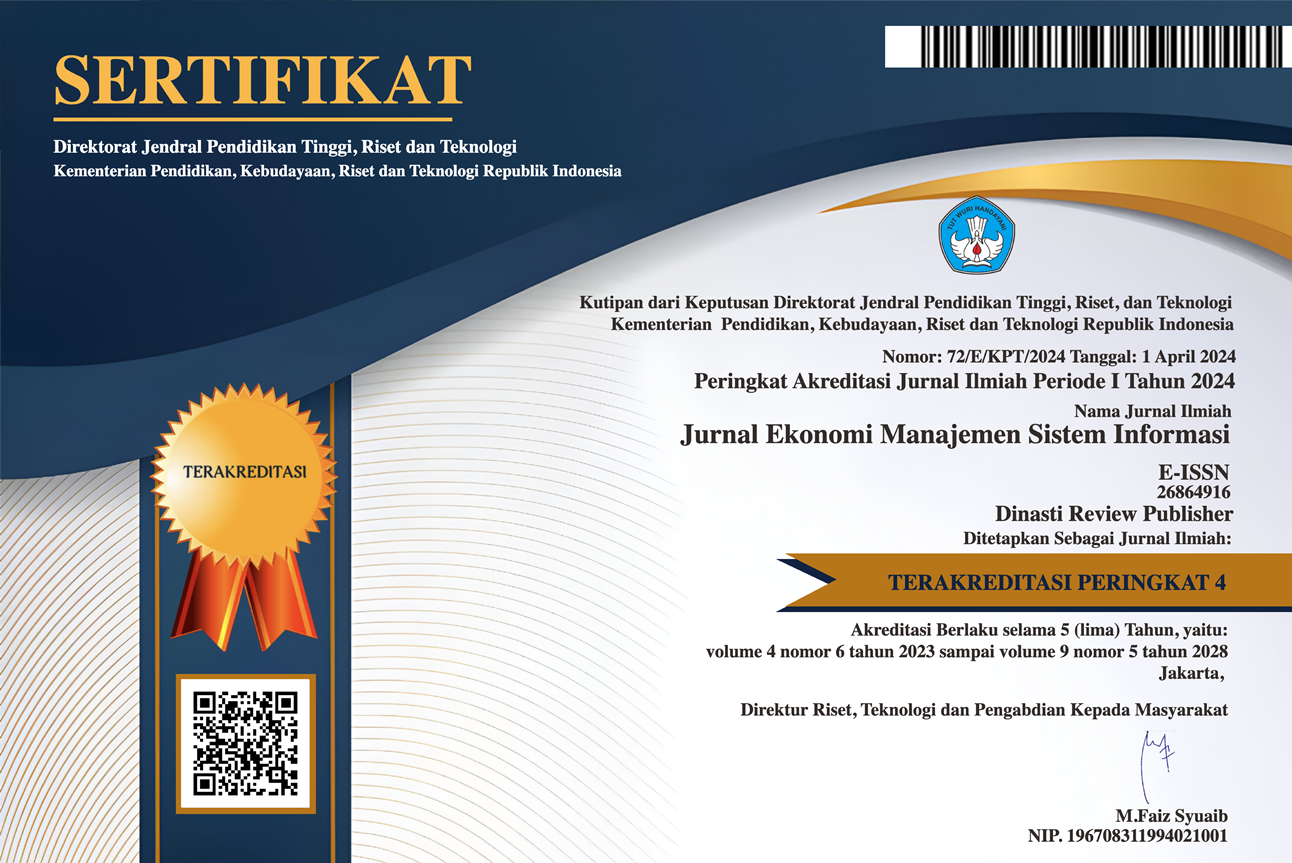PRINSIP-PRINSIP GOOD CORPORATE GOVERNANCE DAN BUSSINES ETHIC PADA PT UNILEVER
DOI:
https://doi.org/10.31933/jemsi.v1i3.107Keywords:
Business Ethics, Good Corporate GovernanceAbstract
Makalah teoritis ini membahas pentingnya tata kelola perusahaan dan etika bisnis yang berdampak pada organisasi dan individu. Sebagai akibat dari malu publik atas penyimpangan perusahaan, organisasi harus mendukung kebijakan dan peraturan mereka untuk mengatasi banyak masalah etika dan untuk memastikan kesejahteraan semua orang. Selanjutnya, tata kelola perusahaan berkaitan dengan kepemilikan, kontrol, dan akuntabilitas organisasi, dan bagaimana pengejaran korporasi terhadap tujuan ekonomi berhubungan dengan sejumlah pertimbangan etis dan sosial yang lebih luas. Dengan demikian, makalah ini menyajikan adopsi praktik tata kelola yang baik dan standar etika bisnis, dan membahas pentingnya pendekatan tersebut dalam menganalisis dan memahami praktik tata kelola perusahaan. Banyak penelitian telah menemukan bahwa pendekatan terpadu terhadap tata kelola perusahaan dan etika bisnis harus membantu organisasi menerapkan standar perilaku etis yang tinggi di seluruh organisasi. Secara umum, keunggulan pendekatan holistik semacam itu, dengan mengintegrasikan beberapa komponen, adalah prasyarat pemahaman yang lebih baik tentang praktik dan prosedur tata kelola perusahaan untuk meningkatkan perilaku etis dalam organisasi.
References
Aguilera, R. V., Judge, W. Q., & Terjesen, S. A. (2018). Corporate governance deviance. Academy of Management Review, 43(1), 87-109.
Birnbaum, S., & De Wispelaere, J. (2016). Basic income in the capitalist economy: the mirage of “exit” from employment. Basic Income Studies, 11(1), 61-74.
Carayannis, E., & Grigoroudis, E. (2016). Quadruple innovation helix and smart specialization: Knowledge production and national competitiveness. ???????, 10 (1 (eng)).
Chen, D., Qi, S., & Schlagenhauf, D. (2018). Corporate income tax, legal form of organization, and employment. American Economic Journal: Macroeconomics, 10(4), 270-304.
Connelly, S., Mumford, M., Steele, L., Mulhearn, T., Watts, L., & Medeiros, K. (2017). What is Working, What is Not, and What We Need to Know: a Meta-Analytic Review of Business Ethics Instruction.
Dallas, L. L. (2017). Is There Hope for Change: The Evolution of Conceptions of Good Corporate Governance. San Diego L. Rev., 54, 491.
Dimopoulos, T., & Wagner, H. F. (2016). Corporate Governance and CEO Turnover Decisions. Swiss Finance Institute Research Paper, (12-16).
Goodwin, R. M., & Punzo, L. F. (2019). The dynamics of a capitalist economy: a multi-sectoral approach. Routledge.
Kalemli-Ozcan, S., & Fan, J. (2016). Emergence of Asia: Reforms, Corporate Savings, and Global Imbalances.
Nagaraj, H., Reddy, B. S., & Satihal, D. G. (2017). Impact of Karnataka state finance corporation on micro, small and medium enterprise development in Karnataka, India. Indian Journal of Economics and Development, 5, 4.
Rodriguez-Fernandez, M. (2016). Social responsibility and financial performance: The role of good corporate governance. BRQ Business Research Quarterly, 19(2), 137-151.
Samra, E. (2016). Corporate governance in Islamic financial institutions.
Trevino, L. K., & Nelson, K. A. (2016). Managing business ethics: Straight talk about how to do it right. John Wiley & Sons.
Zhang, X. (2018). Development Economics. Journal of Political Economy, 59(3), 185-193.
Downloads
Published
How to Cite
Issue
Section
License
Hak cipta :
Penulis yang mempublikasikan manuskripnya di jurnal ini menyetujui ketentuan berikut:
- Hak cipta pada setiap artikel adalah milik penulis.
- Penulis mengakui bahwa Jurnal Ekonomi Manajemen Sistem Informasi (JEMSI) berhak menjadi yang pertama menerbitkan dengan lisensi Creative Commons Attribution 4.0 International (Attribution 4.0 International CC BY 4.0) .
- Penulis dapat mengirimkan artikel secara terpisah, mengatur distribusi non-eksklusif manuskrip yang telah diterbitkan dalam jurnal ini ke versi lain (misalnya, dikirim ke repositori institusi penulis, publikasi ke dalam buku, dll.), dengan mengakui bahwa manuskrip telah diterbitkan pertama kali di Jurnal Ekonomi Manajemen Sistem Informasi (JEMSI).










































































